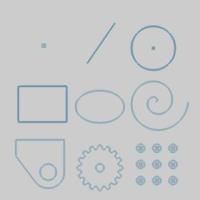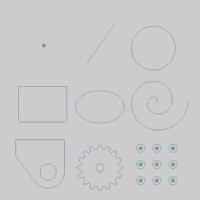 Hole Pattern
Hole Pattern
Introduction
This topic will explain where to find the Hole Pattern function, and explain the options found in it. This topic will also give a brief description of Dynamic Drawing, the Snap Increment function, explain creation with quick steps, and provide links to related topics.
The Hole Pattern Function
The Hole Pattern function creates a circular, or grid, hole pattern based on the settings that you define in the Data Entry Manager.
Dynamic Drawing
This function supports Dynamic Drawing which allows you to use a combination of sketching and data entry to create the entities. After initially sketching the entity, it becomes an active entity, which is an entity that is in Modify Mode. Entities in Modify Mode display in the current Entity color, but displays with a greater line thickness to make them easier to identify. Active entities can be modified using data entry. The benefit of Dynamic Drawing is that you can quickly sketch a point to get the approximate result and then use data entry to update to the exact dimensions, and coordinate values as needed.
|
Entities in Modify Mode |
Final Entities |

|

|
In the images above, we see entities which are still in Modify Mode, followed by those same entities after they are finalized.
Snap Increment
This function support the use of the snap increment when selecting the location of the entities. The snap increment allows you to get precise results when using mouse selection and helps to reduce data entry modifications.
To learn more, view Snap Increment.
Navigation
To open Hole Pattern:
-
In the Pattern group, of the Create 2D ribbon, click
 Hole Pattern.
Hole Pattern.
The parameters display in the Data Entry Manager.
The Data Entry Parameters
The following parameters vary depending on whether a circular, or grid style pattern is selected. Below, you will see each layout side by side.
|
Pattern Parameters
Hole Parameters
|
Pattern Parameters
Hole Parameters
Number of Holes
|
|
Origin
|
|
- OK - performs the function as shown in the preview.
- Cancel - closes the Data Entry Manager.
Quick Steps - Hole Pattern
- Set the Pattern Parameters to define the shape and overall size of the hole pattern.
- Set the Hole Parameters to define the number, and size of the holes, and to set whether the pattern is broken into individual components.
- Set the Origin of the hole pattern.
- Click OK to create the hole pattern.
- Click Cancel to exit the function.
Related Topics






